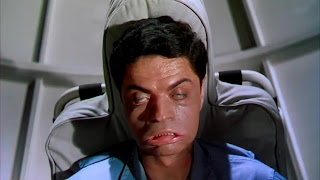 |
| effects of acceleration on astronaut Andre (Ross Martin) |
A giant space wheel has been erected above earth whose purpose is twofold -- as an observation post and as a platform to launch a ship to the moon. However, General Samuel Merritt (Walter Brooke) is informed by his superiors that there will be no test flight to the moon, but a direct trip to Mars where it is hoped they will find a way to replenish the earth's diminishing resources and find more land for a growing population. Merritt leads the expedition with his son, Barney (Eric Fleming), as second-in-command. The others on board include Andre (Ross Martin); the crude technical expert Sgt. Siegle (Phil Foster); the Japanese Sgt. Imoto (Benson Fong); and a stowaway, Sgt. Mahoney (Mickey Shaughnessy), who was told he was too old to go along. Trouble begins when the elder Merritt starts wondering if Man has any right to "invade" space, which, in his opinion, is the province of God. Conquest of Space is a more "serious" science fiction film with character-based melodrama substituting for sexy space-babes, giant spiders, and other far-out elements of fifties outer space epics. Although the human drama is not always convincing in this, it does make the picture more entertaining than it might have been. The special effects are quite good considering this was made in a pre-CGI time period, and the science itself, while far from perfect, is more reasonable than in the more outlandish sci fi flicks made around the same time. There are some good actors in this even if it has what might be called a C level cast. Walter Brooke is fine as the general; he was actually only ten years older than Eric Fleming [Queen of Outer Space], who plays his son. As the dead-common Siegle, Phil Foster isn't terrible, but his character and style of acting make him less comedy relief than extreme irritant. Fong and Shaughnessy are pretty much the same as always, and Ross Martin [The Twilight Zone: "Death Ship"], always a very good actor, isn't given enough to do. The best scenes have to do with a humongous asteroid that almost smashes into the spaceship, and the grim sequence when a dead astronaut's body, still attached to the end of its lifeline, floats outside the porthole. Filmed in technicolor, the Martian landscape is striking. This ambitious picture led the way to the better -- and more macabre -- Forbidden Planet the following year.
Verdict: Highly interesting and well-done early science fiction film. ***.
2 comments:
I very much enjoyed your insightful review of this movie because I feel it's kinda unfairly maligned. I didn't see it until I'd read so many negative things about it, I was expecting the worst--but surprise, it wasn't that bad! I think the special effects, which is what most of the bad reviews I'd seen focused on, were actually pretty decent for the time. What made me laugh though, was the over-the-top script, especially when dealing with melodrama that simply didn't need to be there. Mickey Shaughnessy grabbing Eric Fleming by the collar after he's shot his dad and gritting, "'Cuz I wanna watch ya KICK!" just cracks me up. And poor old Phil Foster getting cuckolded on the big, technicolor screen in front of all his buddies is another major hoot. I mean, wow. He kinda HAD to go to Mars after that, didn't he--if only to escape the humiliation! But overall, I thought it was pretty entertaining--and was clearly a sincere attempt. Certainly not as bad as I'd heard and --good grief! Outer space never looked so colorful!
Your site is a major treasure trove and I'm really enjoying reading your backlog. I'm so glad I found it!
--Mark
Thank you so much, Mark -- I really appreciate the compliments!
When it comes to FX, it's funny how people judge a very old movie by the standards of today -- what do they expect, that it will look as if it were made in the 21st century? I make allowances for a picture's age and budget.
This picture is another I didn't catch up with until years after it came out. I don't think I even saw it on TV when I was a kid, but it was a pleasant surprise despite the flaws that we've both noted.
Post a Comment